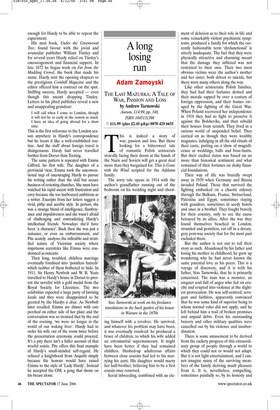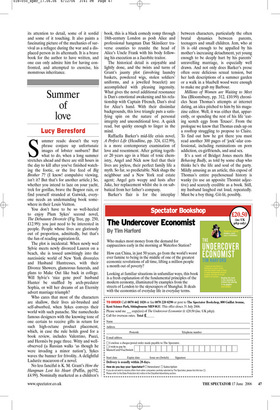A long losing run
Adam Zamoyski
THE LAST MAZURKA: A TALE OF WAR, PASSION AND LOSS by Andrew Tarnowski Aurum, £14.99, pp. 348, ISBN 1845131398 ✆ £11.99 (plus £2.45 p&p) 0870 429 6655 This is indeed a story of war, passion and loss. But those looking for a bittersweet tale of romantic Polish aristocrats stoically facing their doom at the hands of the Nazis and Soviets will get a great deal more than they bargained for. This is Gone with the Wind scripted for the Addams family.
The sorry tale opens in 1914 with the author’s grandfather running out of the bedroom on his wedding night and shoot ing himself with a revolver. He survived, and whatever his problem may have been, it was eventually resolved: he produced a brace of children, to which his wife added an extramarital supernumerary. It might have been better if they had remained childless. Hushed-up adulterous affairs between close cousins had led to his marrying his aunt. His daughter would marry her half-brother, believing him to be a first cousin once removed.
Serial inbreeding, combined with an ele ment of delusion as to their role in life and some remarkably violent psychiatric symptoms, produced a family for which the currently fashionable term ‘dysfunctional’ is utterly inadequate. The fact that they were physically attractive and charming meant that the damage they inflicted was not restricted to their own. Their two most obvious victims were the author’s mother and her sister, both driven to suicide, but there were many others along the way.
Like other aristocratic Polish families, they had had their fortunes dented and their morale sapped by over a century of foreign oppression, and their homes ravaged by the fighting of the Great War. When Poland recovered her independence in 1918 they had to fight to preserve it against the Bolsheviks, and then rebuild their houses from scratch. They lived in a curious world of suspended belief. They carried on as though they were wealthy magnates, indulging in all the old rituals of their caste, putting on a show of magnificence at weddings, balls and boar-hunts. But their exalted status was based on no more than historical sentiment and what remained of their fortunes on shaky financial foundations.
Their way of life was brutally swept away in 1939 when Germany and Russia invaded Poland. Those that survived the fighting embarked on a chaotic odyssey through the Balkans, France, Switzerland, Palestine and Egypt, sometimes staying with grandees, sometimes in seedy hotels and once in a brothel. They fought bravely for their country, only to see the cause betrayed by its allies. After the war they found themselves beached in London, stranded and penniless, cut off in a dreary, grey post-war society that for the most part excluded them.
But the author is not out to tell their story as such. Abandoned by his father and losing his mother in childhood, he grew up wondering why he had never known the same parental love as his peers. This is a voyage of discovery, and it is with his father, Stas Tarnowski, that he is primarily concerned. The man was a monster, an unquiet soul full of anger who fed on cruelty and erupted into violence at the slightest provocation. He was self-centred, arrogant and faithless, apparently convinced that he was some kind of superior being to whom normal rules did not apply, and he left behind him a trail of broken promises and unpaid debts. Even his outstanding bravery and other military qualities were cancelled out by his violence and insubordination.
There is some amusement to be derived from the rackety progress of this extraordinary group of people through a world to which they could not or would not adapt. But it is not light entertainment, and I cannot imagine many of the surviving members of the family deriving much pleasure from it. It is, nevetheless, compelling, sometimes painfully so, by its honesty and its attention to detail, some of it sordid and some of it touching. It also paints a fascinating picture of the mechanics of survival as a refugee during the war and a displaced person in its aftermath. It is a brave book for the author to have written, and one can only admire him for having confronted, and attempted to exorcise, his monstrous inheritance.



















































































 Previous page
Previous page